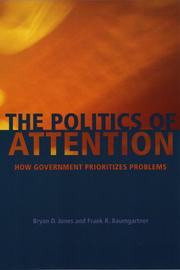| Listing 1 - 10 of 23 | << page >> |
Sort by
|
Book
ISBN: 0822985195 Year: 1989 Publisher: Pittsburgh, Pennsylvania : University of Pittsburgh Press,
Abstract | Keywords | Export | Availability | Bookmark
 Loading...
Loading...Choose an application
- Reference Manager
- EndNote
- RefWorks (Direct export to RefWorks)
Education policy provides a fertile ground for analyzing the perennial tug-of-war between interest groups and public officials. Baumgartner considers thirty examples of French education policymaking during the early 1980s using a combination of documentary evidence, interviews with more than 100 politicians, civil servants, members of parliament, union and interest group leaders, and a thorough analysis of press coverage of education topics.
Education and state --- History --- France --- Politics and government
Book
ISBN: 9780226039442 9780226039459 0226039447 0226039455 Year: 2009 Publisher: Chicago (Ill.): University of Chicago press,
Abstract | Keywords | Export | Availability | Bookmark
 Loading...
Loading...Choose an application
- Reference Manager
- EndNote
- RefWorks (Direct export to RefWorks)
Washington lobbies are far less influential than political rhetoric suggests. In fact, sixty percent of recent lobbying campaigns failed to change policy despite millions of dollars spent trying. This book explains why. During the 2008 election season, politicians from both sides of the aisle promised to rid government of lobbyists’ undue influence. For the authors of Lobbying and Policy Change, the most extensive study ever done on the topic, these promises ring hollow—not because politicians fail to keep them but because lobbies are far less influential than political rhetoric suggests.Based on a comprehensive examination of ninety-eight issues, this volume demonstrates that sixty percent of recent lobbying campaigns failed to change policy despite millions of dollars spent trying. Why? The authors find that resources explain less than five percent of the difference between successful and unsuccessful efforts. Moreover, they show, these attempts must overcome an entrenched Washington system with a tremendous bias in favor of the status quo.Though elected officials and existing policies carry more weight, lobbies have an impact too, and when advocates for a given issue finally succeed, policy tends to change significantly. The authors argue, however, that the lobbying community so strongly reflects elite interests that it will not fundamentally alter the balance of power unless its makeup shifts dramatically in favor of average Americans’ concerns.
Political sociology --- Public administration --- United States --- Lobbying --- Political planning --- ABŞ --- ABSh --- Ameerika Ühendriigid --- America (Republic) --- Amerika Birlăshmish Shtatlary --- Amerika Birlăşmi Ştatları --- Amerika Birlăşmiş Ştatları --- Amerika ka Kelenyalen Jamanaw --- Amerika Qūrama Shtattary --- Amerika Qŭshma Shtatlari --- Amerika Qushma Shtattary --- Amerika (Republic) --- Amerikai Egyesült Államok --- Amerikanʹ Veĭtʹsėndi︠a︡vks Shtattnė --- Amerikări Pĕrleshu̇llĕ Shtatsem --- Amerikas Forenede Stater --- Amerikayi Miatsʻyal Nahangner --- Ameriketako Estatu Batuak --- Amirika Carékat --- AQSh --- Ar. ha-B. --- Arhab --- Artsot ha-Berit --- Artzois Ha'bris --- Bí-kok --- Ē.P.A. --- EE.UU. --- Egyesült Államok --- ĒPA --- Estados Unidos --- Estados Unidos da América do Norte --- Estados Unidos de América --- Estaos Xuníos --- Estaos Xuníos d'América --- Estatos Unitos --- Estatos Unitos d'America --- Estats Units d'Amèrica --- Ètats-Unis d'Amèrica --- États-Unis d'Amérique --- Fareyniḳṭe Shṭaṭn --- Feriene Steaten --- Feriene Steaten fan Amearika --- Forente stater --- FS --- Hēnomenai Politeiai Amerikēs --- Hēnōmenes Politeies tēs Amerikēs --- Hiwsisayin Amerikayi Miatsʻeal Tērutʻiwnkʻ --- Istadus Unidus --- Jungtinės Amerikos valstybės --- Mei guo --- Mei-kuo --- Meiguo --- Mî-koet --- Miatsʻyal Nahangner --- Miguk --- Na Stàitean Aonaichte --- NSA --- S.U.A. --- SAD --- Saharat ʻAmērikā --- SASht --- Severo-Amerikanskie Shtaty --- Severo-Amerikanskie Soedinennye Shtaty --- Si︠e︡vero-Amerikanskīe Soedinennye Shtaty --- Sjedinjene Američke Države --- Soedinennye Shtaty Ameriki --- Soedinennye Shtaty Severnoĭ Ameriki --- Soedinennye Shtaty Si︠e︡vernoĭ Ameriki --- Spojené obce severoamerické --- Spojené staty americké --- SShA --- Stadoù-Unanet Amerika --- Stáit Aontaithe Mheiriceá --- Stany Zjednoczone --- Stati Uniti --- Stati Uniti d'America --- Stâts Unîts --- Stâts Unîts di Americhe --- Steatyn Unnaneysit --- Steatyn Unnaneysit America --- SUA (Stati Uniti d'America) --- Sŭedineni amerikanski shtati --- Sŭedinenite shtati --- Tetã peteĩ reko Amérikagua --- U.S. --- U.S.A. --- United States of America --- Unol Daleithiau --- Unol Daleithiau America --- Unuiĝintaj Ŝtatoj de Ameriko --- US --- USA --- Usono --- Vaeinigte Staatn --- Vaeinigte Staatn vo Amerika --- Vereinigte Staaten --- Vereinigte Staaten von Amerika --- Verenigde State van Amerika --- Verenigde Staten --- VS --- VSA --- Wááshindoon Bikéyah Ałhidadiidzooígíí --- Wilāyāt al-Muttaḥidah --- Wilāyāt al-Muttaḥidah al-Amirīkīyah --- Wilāyāt al-Muttaḥidah al-Amrīkīyah --- Yhdysvallat --- Yunaeted Stet --- Yunaeted Stet blong Amerika --- ZDA --- Združene države Amerike --- Zʹi︠e︡dnani Derz︠h︡avy Ameryky --- Zjadnośone staty Ameriki --- Zluchanyi︠a︡ Shtaty Ameryki --- Zlucheni Derz︠h︡avy --- ZSA --- Η.Π.Α. --- Ηνωμένες Πολιτείες της Αμερικής --- Америка (Republic) --- Американь Вейтьсэндявкс Штаттнэ --- Америкӑри Пӗрлешӳллӗ Штатсем --- САЩ --- Съединените щати --- Злучаныя Штаты Амерыкі --- ولايات المتحدة --- ولايات المتّحدة الأمريكيّة --- ولايات المتحدة الامريكية --- 미국 --- Politics and government --- #SBIB:328H31 --- #SBIB:324H44 --- Instellingen en beleid: VSA / USA --- Politieke structuren: drukkingsgroepen, lobbying --- États-Unis --- É.-U. --- ÉU --- Lobbying - United States --- Political planning - United States --- United States - Politics and government - 21st century
Book
Year: 2009 Publisher: Chicago University of Chicago Press
Abstract | Keywords | Export | Availability | Bookmark
 Loading...
Loading...Choose an application
- Reference Manager
- EndNote
- RefWorks (Direct export to RefWorks)

ISBN: 0226406539 0226406520 9780226406534 9780226406527 Year: 2005 Publisher: Chicago: University of Chicago press,
Abstract | Keywords | Export | Availability | Bookmark
 Loading...
Loading...Choose an application
- Reference Manager
- EndNote
- RefWorks (Direct export to RefWorks)
On any given day, policymakers are required to address a multitude of problems and make decisions about a variety of issues, from the economy and education to health care and defense. This has been true for years, but until now no studies have been conducted on how politicians manage the flood of information from a wide range of sources. How do they interpret and respond to such inundation? Which issues do they pay attention to and why? Bryan D. Jones and Frank R. Baumgartner answer these questions on decision-making processes and prioritization in 'The Politics of Attention'. Analyzing fifty years of data, Jones and Baumgartner's book is the first study of American politics based on a new information-processing perspective. The authors bring together the allocation of attention and the operation of governing institutions into a single model that traces public policies, public and media attention to them, and governmental decisions across multiple institutions. 'The Politics of Attention' offers a groundbreaking approach to American politics based on the responses of policymakers to the flow of information. It asks how the system solves, or fails to solve, problems rather than looking to how individual preferences are realized through political action.
Government --- United States --- Political planning --- Government information --- Objectivity --- Politics and government --- Decision making --- #SBIB:35H410 --- #SBIB:35H412 --- Beleidscyclus: algemene werken --- Beleidscyclus: vaststelling, besluitvorming --- Government information. --- Objectivity. --- Decision making. --- 841.5 Bestuur en beleid --- Information, Government --- Freedom of information --- Public records --- Knowledge, Theory of --- Reality --- Personal equation --- U.S.A. --- Jungtinės Amerikos valstybės --- Soedinennye Shtaty Si︠e︡vernoĭ Ameriki --- Soedinennye Shtaty Severnoĭ Ameriki --- Si︠e︡vero-Amerikanskīe Soedinennye Shtaty --- Severo-Amerikanskie Soedinennye Shtaty --- Zlucheni Derz︠h︡avy --- USA --- US --- Arhab --- Ar. ha-B. --- Artsot ha-Berit --- ولايات المتحدة الامريكية --- Wilāyāt al-Muttaḥidah al-Amirīkīyah --- ABSh --- Amerika Birlăshmish Shtatlary --- ABŞ --- Amerika Birlăşmi Ştatları --- Forente stater --- Spojené staty americké --- Severo-Amerikanskie Shtaty --- Sjedinjene Američke Države --- Zʹi︠e︡dnani Derz︠h︡avy Ameryky --- Amerikai Egyesült Államok --- Yhdysvallat --- Verenigde Staten --- Egyesült Államok --- Hiwsisayin Amerikayi Miatsʻeal Tērutʻiwnkʻ --- Estados Unidos de América --- United States of America --- Fareyniḳṭe Shṭaṭn --- Artzois Ha'bris --- Estados Unidos da América do Norte --- SShA --- Soedinennye Shtaty Ameriki --- VSA --- États-Unis d'Amérique --- Vereinigte Staaten von Amerika --- Stati Uniti d'America --- Estados Unidos --- EE.UU. --- Stany Zjednoczone --- ĒPA --- Amerika Qūrama Shtattary --- Amerika Qŭshma Shtatlari --- SAD --- Saharat ʻAmērikā --- Hēnomenai Politeiai Amerikēs --- ZSA --- Mei-kuo --- Meiguo --- Mei guo --- ZDA --- Združene države Amerike --- U.S. --- America (Republic) --- Amirika Carékat --- Verenigde State van Amerika --- VS --- ولايات المتحدة --- Wilāyāt al-Muttaḥidah --- ولايات المتّحدة الأمريكيّة --- Wilāyāt al-Muttaḥidah al-Amrīkīyah --- Estatos Unitos --- Estatos Unitos d'America --- Ètats-Unis d'Amèrica --- Estaos Xuníos d'América --- Estaos Xuníos --- Tetã peteĩ reko Amérikagua --- Istadus Unidus --- Amerika Birlăşmiş Ştatları --- Amerika ka Kelenyalen Jamanaw --- Bí-kok --- Amerika Qushma Shtattary --- AQSh --- Злучаныя Штаты Амерыкі --- Zluchanyi︠a︡ Shtaty Ameryki --- Yunaeted Stet blong Amerika --- Yunaeted Stet --- Vaeinigte Staatn --- Vaeinigte Staatn vo Amerika --- Stadoù-Unanet Amerika --- Sŭedineni amerikanski shtati --- САЩ --- SASht --- Съединените щати --- Sŭedinenite shtati --- Америка (Republic) --- Amerika (Republic) --- Estats Units d'Amèrica --- Америкӑри Пӗрлешӳллӗ Штатсем --- Amerikări Pĕrleshu̇llĕ Shtatsem --- Stati Uniti --- SUA (Stati Uniti d'America) --- Unol Daleithiau America --- Unol Daleithiau --- Amerikas Forenede Stater --- Vereinigte Staaten --- Wááshindoon Bikéyah Ałhidadiidzooígíí --- Zjadnośone staty Ameriki --- Ameerika Ühendriigid --- Ηνωμένες Πολιτείες της Αμερικής --- Hēnōmenes Politeies tēs Amerikēs --- Η.Π.Α. --- Ē.P.A. --- Usono --- Unuiĝintaj Ŝtatoj de Ameriko --- Американь Вейтьсэндявкс Штаттнэ --- Amerikanʹ Veĭtʹsėndi︠a︡vks Shtattnė --- Ameriketako Estatu Batuak --- Feriene Steaten --- Feriene Steaten fan Amearika --- FS --- Stâts Unîts di Americhe --- Stâts Unîts --- Stáit Aontaithe Mheiriceá --- Steatyn Unnaneysit America --- Steatyn Unnaneysit --- S.U.A. --- Na Stàitean Aonaichte --- NSA --- Mî-koet --- 미국 --- Miguk --- Amerikayi Miatsʻyal Nahangner --- Miatsʻyal Nahangner --- Американь Вейтьсэндявкс Штаттнэ --- Spojené obce severoamerické --- États-Unis --- É.-U. --- ÉU --- Political planning - United States --- United States - Politics and government - Decision making

ISBN: 0226039382 0226039390 Year: 1993 Volume: *7 Publisher: Chicago London University of Chicago Press
Abstract | Keywords | Export | Availability | Bookmark
 Loading...
Loading...Choose an application
- Reference Manager
- EndNote
- RefWorks (Direct export to RefWorks)
Internal politics --- United States --- Beleidswetenschappen --- Policy sciences --- Politique [Sciences de la ] --- Sciences de la politique --- Political planning --- -Policy sciences --- #SBIB:35H6030 --- #SBIB:35H411 --- #SBIB:003.IO --- Policy-making --- Policymaking --- Public policy management --- Planning in politics --- Public policy --- Planning --- Politics, Practical --- Public administration --- Bestuur en beleid: nationale en regionale studies: Verenigde Staten --- Beleidscyclus: voorbereiding (inclusief planning) --- Politics and government. --- Government --- History, Political --- Policy sciences. --- Politique publique --- Etats-Unis --- Politique et gouvernement --- Politics and government --- United States of America

ISBN: 0226039404 0226039412 9780226039404 9780226039411 Year: 2002 Publisher: Chicago (Ill.): University of Chicago press,
Abstract | Keywords | Export | Availability | Bookmark
 Loading...
Loading...Choose an application
- Reference Manager
- EndNote
- RefWorks (Direct export to RefWorks)
Political planning --- United States --- Politics and government --- -#SBIB:35H410 --- #SBIB:35H411 --- #SBIB:024.IOS --- Planning in politics --- Public policy --- Planning --- Policy sciences --- Politics, Practical --- Public administration --- Beleidscyclus: algemene werken --- Beleidscyclus: voorbereiding (inclusief planning) --- -Politics and government --- -Political planning --- #SBIB:35H410 --- Political planning - United States --- United States - Politics and government - 1945-1989 --- United States - Politics and government - 1989

ISBN: 0691059152 0691059144 9780691059150 1282458221 1400800447 1400810957 1400822483 9786612458224 9781400810956 9780691059143 Year: 1998 Publisher: Princeton, N.J.: Princeton university press,
Abstract | Keywords | Export | Availability | Bookmark
 Loading...
Loading...Choose an application
- Reference Manager
- EndNote
- RefWorks (Direct export to RefWorks)
A generation ago, scholars saw interest groups as the single most important element in the American political system. Today, political scientists are more likely to see groups as a marginal influence compared to institutions such as Congress, the presidency, and the judiciary. Frank Baumgartner and Beth Leech show that scholars have veered from one extreme to another not because of changes in the political system, but because of changes in political science. They review hundreds of books and articles about interest groups from the 1940's to today; examine the methodological and conceptual problems that have beset the field; and suggest research strategies to return interest-group studies to a position of greater relevance. The authors begin by explaining how the group approach to politics became dominant forty years ago in reaction to the constitutional-legal approach that preceded it. They show how it fell into decline in the 1970's as scholars ignored the impact of groups on government to focus on more quantifiable but narrower subjects, such as collective-action dilemmas and the dynamics of recruitment. As a result, despite intense research activity, we still know very little about how groups influence day-to-day governing. Baumgartner and Leech argue that scholars need to develop a more coherent set of research questions, focus on large-scale studies, and pay more attention to the context of group behavior. Their book will give new impetus and direction to a field that has been in the academic wilderness too long.
Pressure groups --- Lobbying --- Political sociology --- United States --- Pressure groups - United States --- Lobbying - United States --- United States of America
Book
ISBN: 0198835337 9780198835332 0192572237 0191872946 0192572229 Year: 2019 Publisher: Oxford Oxford University Press
Abstract | Keywords | Export | Availability | Bookmark
 Loading...
Loading...Choose an application
- Reference Manager
- EndNote
- RefWorks (Direct export to RefWorks)
This book summarizes recent advances in the work on agenda-setting in a comparative perspective. The book first presents and explains the data-gathering effort undertaken within the Comparative Agendas Project over the past ten years. Individual country chapters then present the research undertaken within the many national projects. The third section illustrates the possibilities and directions for new research in comparative public policy using the data presented in this book. All the data used and discussed in the book is moreover publicly available. 0The book represents a significant contribution to the study of comparative public policy. By introducing a unified research infrastructure it opens up new possibilities for both empirical and theoretical research in this area.
Policy sciences --- Political planning --- Comparative government --- Comparative political systems --- Comparative politics --- Government, Comparative --- Political systems, Comparative --- Political science --- Planning in politics --- Public policy --- Planning --- Politics, Practical --- Public administration --- Policy-making --- Policymaking --- Public policy management --- #SBIB:35H006 --- #SBIB:35H400 --- Bestuurswetenschappen: theorieën --- Beleid: algemeen --- Sociology of policy --- 88.60 policy science: general. --- Comparative government. --- Policy sciences. --- Political planning.
Book
ISBN: 9780226198125 9780226198095 9780226198262 022619809X 022619812X 022619826X Year: 2015 Publisher: Chicago: University of Chicago press,
Abstract | Keywords | Export | Availability | Bookmark
 Loading...
Loading...Choose an application
- Reference Manager
- EndNote
- RefWorks (Direct export to RefWorks)
Political sociology --- Sociology of policy --- Public administration --- United States --- Federal government --- Policy sciences --- Information resources management --- Politics and government --- Federal government - Information resources management - United States --- Policy sciences - United States --- United States - Politics and government - 1945-1989 --- United States - Politics and government - 1989 --- -Federal government - Information resources management - United States --- -Political sociology --- United States of America
Book
ISBN: 0191872946 0192572229 0192572237 0198835337 9780198835332 Year: 2019 Publisher: Oxford: Oxford university press,
Abstract | Keywords | Export | Availability | Bookmark
 Loading...
Loading...Choose an application
- Reference Manager
- EndNote
- RefWorks (Direct export to RefWorks)
This book summarizes recent advances in the work on agenda-setting in a comparative perspective. The book first presents and explains the data-gathering effort undertaken within the Comparative Agendas Project over the past ten years. Individual country chapters then present the research undertaken within the many national projects. The third section illustrates the possibilities and directions for new research in comparative public policy using the data presented in this book. All the data used and discussed in the book is moreover publicly available. 0The book represents a significant contribution to the study of comparative public policy. By introducing a unified research infrastructure it opens up new possibilities for both empirical and theoretical research in this area.
Policy sciences. --- Policy-making --- Policymaking --- Public policy management --- Political planning. --- Comparative government. --- Comparative political systems --- Comparative politics --- Government, Comparative --- Political systems, Comparative --- Political science --- Planning in politics --- Public policy --- Planning --- Policy sciences --- Politics, Practical --- Public administration --- Political planning --- Comparative government --- Sociology of policy --- 88.60 policy science: general.
| Listing 1 - 10 of 23 | << page >> |
Sort by
|

 Search
Search Feedback
Feedback About UniCat
About UniCat  Help
Help News
News